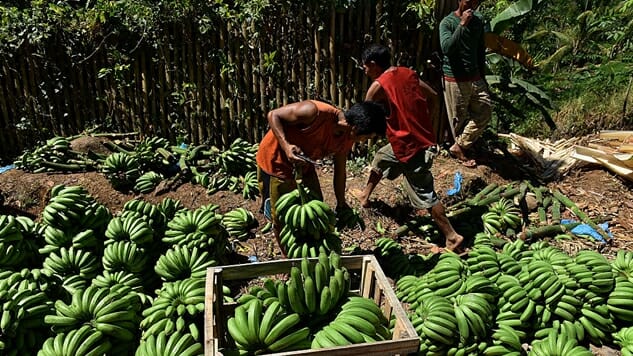How Bananas Helped This Businesswoman Shake up the Indian Feminine Hygiene Market
Photo by Jes Aznar/Getty
It was in the summer of 2009, when Amrita Saigal was working as a summer intern at Procter & Gamble, that a conversation with her grandmother changed the course of her career. Saigal found out that her grandmother, a native of India, used old rags for her menstrual cycles, had to miss school every time she got her period and had to sleep in a separate outhouse.
Worse, Saigal’s grandmother was hardly alone. After that conversation, Saigal started researching the Indian feminine hygiene products market and found that only about 12 percent of Indian women at the time used sanitary pads, and that taboo about menstruation and the lack of access to hygiene products were the leading reasons why girls dropped out of school at higher rates than boys.
At Procter & Gamble, Saigal had helped design equipment to manufacture Always pads and Tampax tampons, so the MIT mechanical engineering graduate decided to leverage her expertise to launch Saathi, a social entrepreneurship business in India aimed at developing sustainable solutions to the problem that continues to affect many women in the country.
Biodegradable and Compostable
Saigal, who launched Saathi (which means “friend” in Hindi) along with co-founder Kristin Kagetsu, in 2015, was convinced that the sanitary pads had to be birthed from local solutions while keeping local challenges in mind.
The first problem: waste. Pads made out of plastic were not an option because they contributed to landfills. In rural India where menstruation is still taboo and kept under wraps quite literally, pads would have to be easily disposed. The answer? Banana fiber. Pads made from banana fibers, Saigal found, are very absorbent and equally important, completely compostable. Women often burned pads to get rid of all evidence and banana fiber pads are easy to burn, and unlike their plastic counterparts, did not release harmful carcinogens into the atmosphere during the process.
As it happens, India leads the world in banana production, and farmers who ordinarily threw the plants away after harvesting the crop now have an additional income stream in Saathi. “This is not like wood pulp where you’re cutting down perfectly good trees, these banana plants have to be cut down anyway and these farmers who want nothing to do with the trunk of the tree, they sell them to us,” Saigal says.
Incremental Inroads
While sanitary pads are available in Indian cities, access in rural areas is a challenge. Giants like P&G and Johnson & Johnson, Saigal points out, have been focusing on India’s competitive urban markets, which leaves room for upstarts like Saathi to make inroads in the countryside.
Eager to address accessibility issues with sanitary pads in India, Saigal’s initial goal was to design a machine that women all over India could operate by themselves. “We got the machine into the hands of a few different women’s self-help groups for feedback and the biggest challenge we found was quality control: when you have one machine sitting in rural Kerala, one in Haryana, how do you ensure quality? Just shipping of the raw materials all over was another difficult challenge,” Saigal says.
Plan B, which was to set up a central manufacturing facility in Ahmedabad in the Indian state of Gujarat, kicked into place. Gujarat is one of the banana-growing states in India and Ahmedabad is also close to the others, including Maharashtra and Kerala. To address affordability, the pads are extremely reasonably priced at five rupees (less than ten cents) each.
-

-

-

-

-

-

-

-

-

-

-

-

-

-

-

-

-

-

-

-

-

-

-

-

-

-

-

-

-

-

-

-

-

-

-

-

-

-

-

-








































